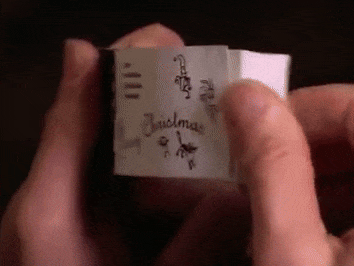
Animation
Flip Book
 One of the first animation assignments at the Disney company in the 40's was a bouncing ball exercise.
One of the first animation assignments at the Disney company in the 40's was a bouncing ball exercise. Animators were to make a ball appear to bounce across the page. Some took the exercise further and put a ring around the ball to show how it rotated as it bounced while others made surprise endings like an explosion on the final bounce.
One of the first drawn animation assignments for our students is a bouncing ball flip book where students use one side of the flip book to make a bouncing ball and on the reverse side they create their own animation. Squash and stretch principles are emphasized. Below is an example of the timing and squash/stretch of the ball as we animate it.
Evaluation:
2 points -- Bouncing ballRemaining points go toward the second animation students do on the opposite side of the flip book:
1 point -- Use of class time
1 point -- Neatness
3 points -- Smoothness of motion
3 points -- Utilization of squash and stretch principles
10 points total

Emma W's Flip-book Ball Animation on Youtube
Downloadable version of Emma's Flip-book Ball Animation
Emma W's 2nd Flip-book Animation on Youtube
Downloadable version of Emma's Second Flip-book Animation
Kyla's Flip-book Ball Animation on Youtube
Kyla's Downloadable version of Kyla's flip book.
Kyla's 2nd Flip-book Ball Animation on Youtube
Kyla's Downloadable version of Kyla's second flip book.
Emma V's Flip-book Ball Animation on Youtube
Emma V's Downloadable version of Emma's flip book.
Emma V's Flip-book Rocket Animation on Youtube
Emma V's Downloadable version of Emma's second flip book.